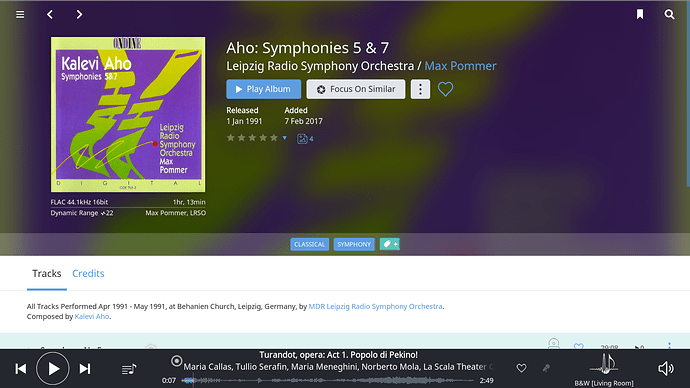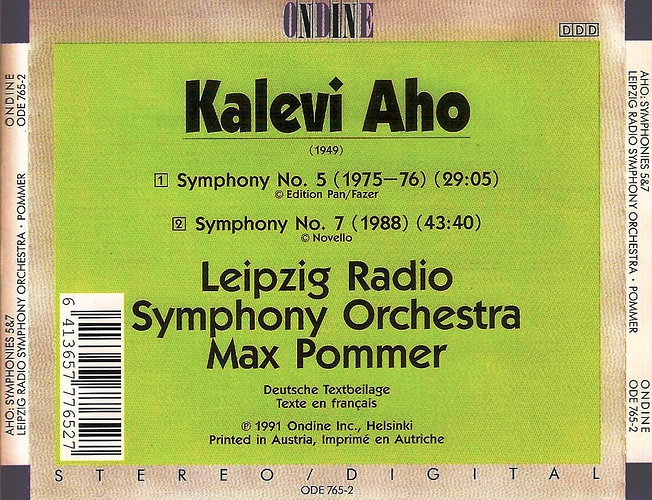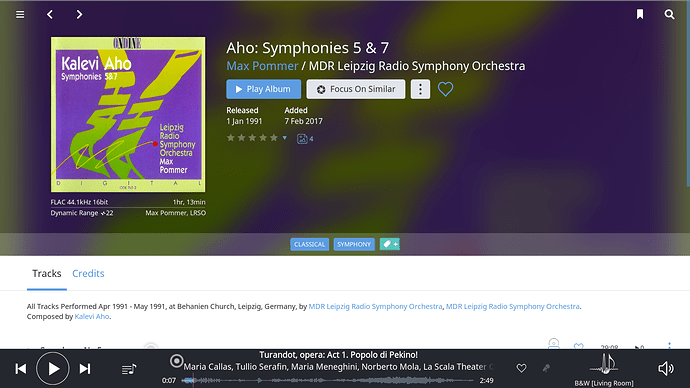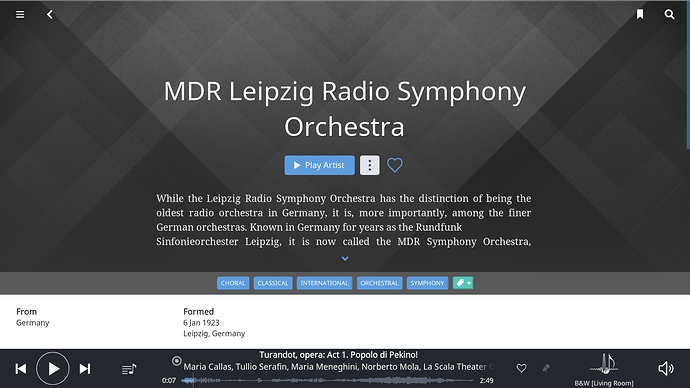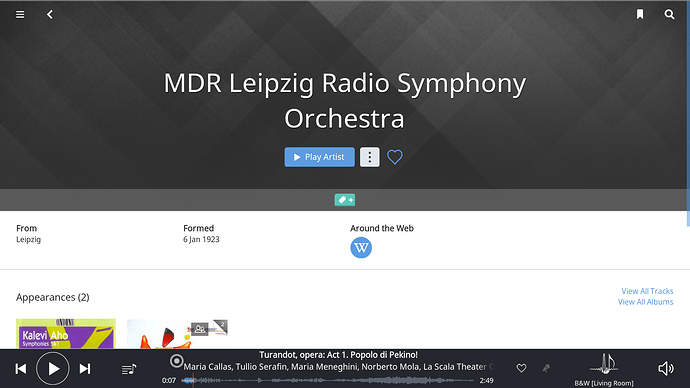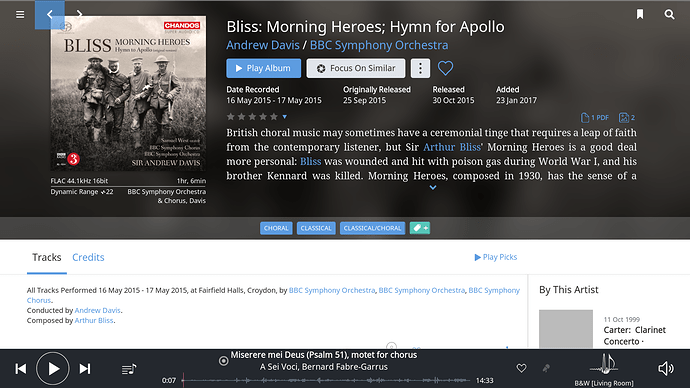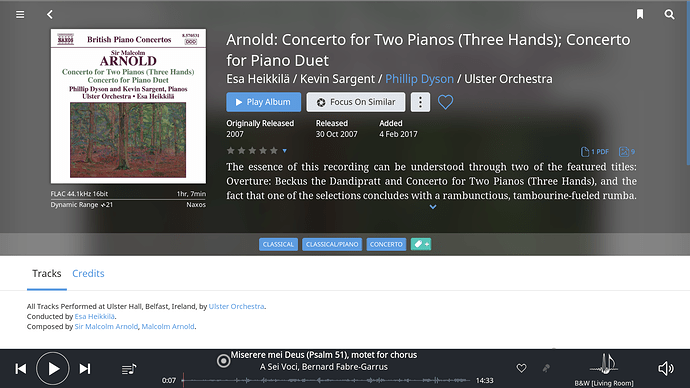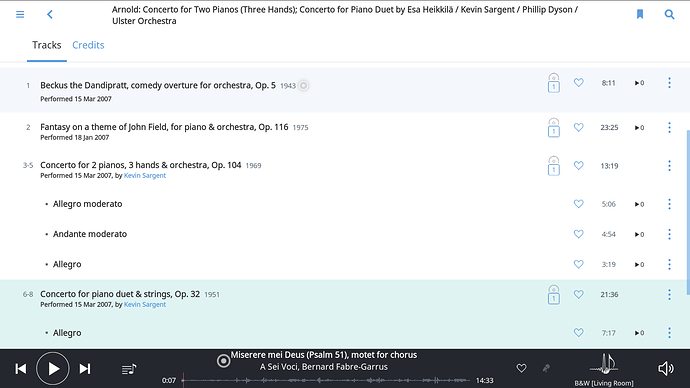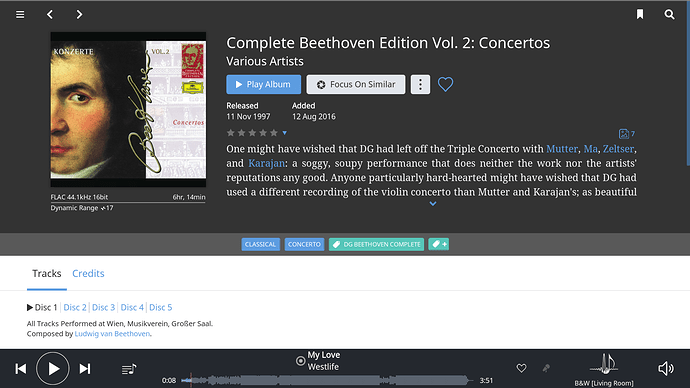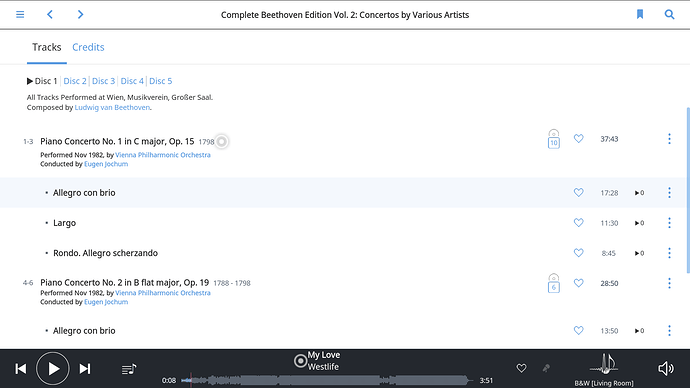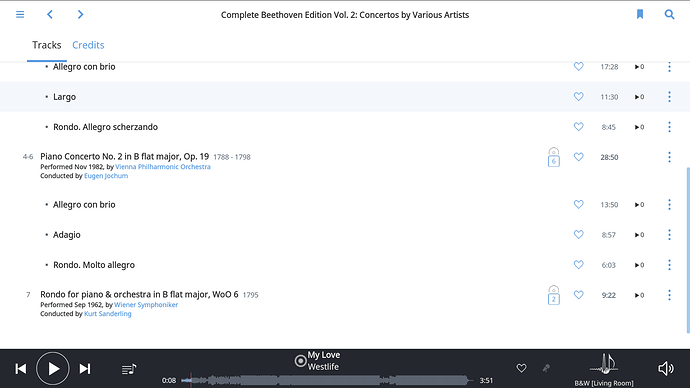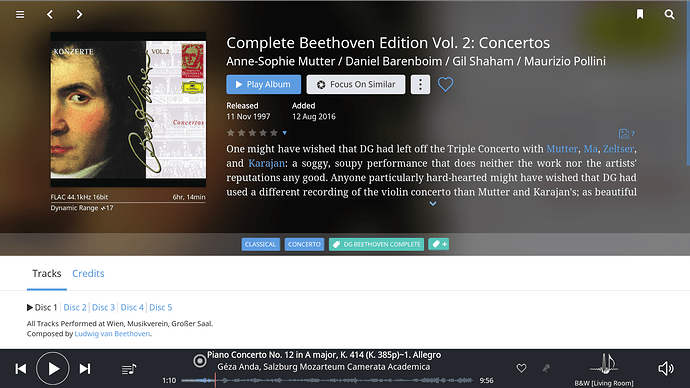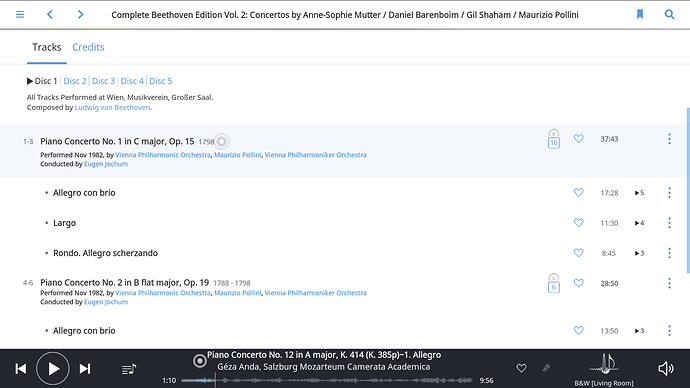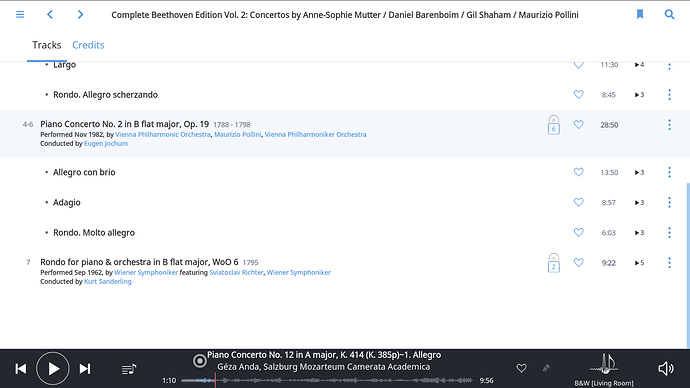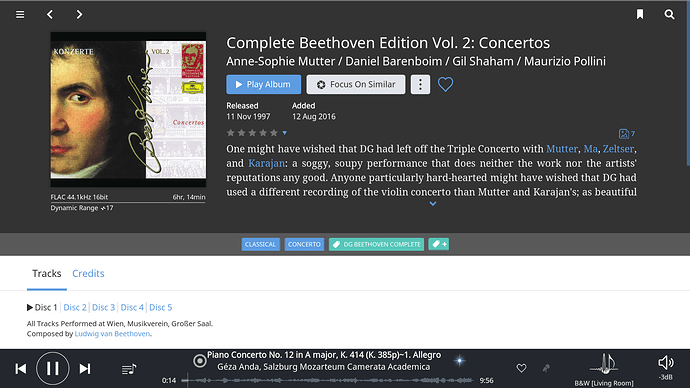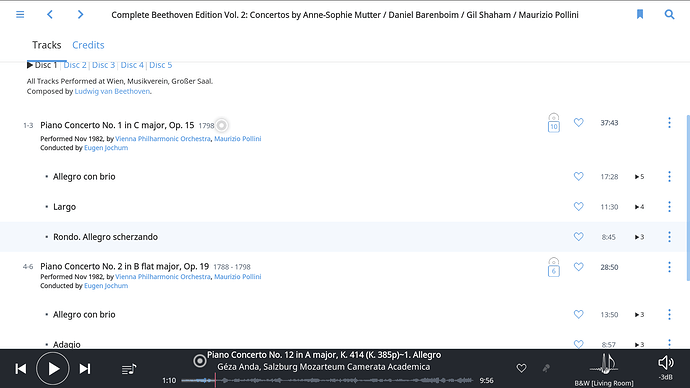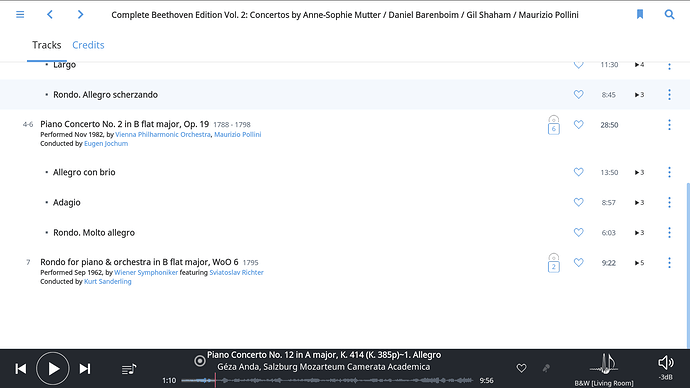Thanks, Joel. Dealing with metadata is a Herculean task - cleaning out the Aegean stables comes to mind. Good luck in your endeavours.
thanks a lot @joel and @Ludwig for your comments. It is good to hear that Roon guys are reading.
However, please allow me to be nagging a little bit. If it is more complicated than we think why not offer a documentation that explains it properly?
I have no problem “merging artists when Roon has no metadata for one of them” but I always edit the name of the artists to be the same before I merge.
How should anybody know that this is the way to go? Is it the way to go? Or did you just by accident adopted a way of merging that works?
I can select two artists even if they are different in name and click on “merge”, so why shouldn’t the user assume that this is the way to do it? It’s the same way with merging compositions. If they wouldn’t be different in text there would not be the need to merge them.
Working in the IT business myself I am familar with the difficult balance between development speed and documentation requirements but even if I’m very happy with how Roon developed with 1.3 I still have the feeling that there’s lots of guessing involved for the user.
There is so much happening in the background that the need for proper documentation on how the system reacts to primary data fed into it is just so much more important.
Having followed a similar discussion with JRIver in the past years I am absolutely conviced that it is not the right way to ask the user to figure it out by himself or to write How-To’s for a software company (not implying that you are, but you could read the offer to be a writer for Roon in such a manner).
Users can certainly provide input to the documentation and even enhance it with a different style of writing or addtional examples but the documentation on “how it works” should be there first.
Please do not get me wrong: I very much like where Roon heads to DB structure wise and I am very willing to be patient and trusting on the way to “get there”, but I also expect a certain transparency that goes beyond the “it’s more complicated than you think” explanation.
Personally I’d rather live with a lower development speed but with proper documentation on how the wizardry works. If you can’t explain the algorithm to your users how do you want to do the coding for this algorithm? How to you do your tests if the use/test cases are not described properly?
Having said all that I am still aware that I am propably a minority in expressing those wishes and I have no problem with that - just wanted to offer my honest opinion. I think we all want Roon to succeed because it is what lots of us classical music lovers have waited for, so please don’t see that as any kind of “bashing” but as a try to share our user experience in order to make Roon better.
Regards
Klaus
Ah, now I see the disconnect. I don’t want to see equivalents displayed separately either. Makes no sense.
What I had hoped was that it would be possible to make the ‘master’ equivalent configurable. At the moment roon appears to be making a decision during the identification process that all equivalents from this list:

will be catageorised as “Vienna Philharmonic Orchestra”. I would like to have some means of categorising all these equivalents as “Weiner Philharmoniker”. The expectation would be that all references to “Vienna Philharmonic Orchestra” would be bannished from the user experience of my personalised roon.
-
At the end of the day I seem to be asking for a feature request to make the selection of the ‘master’ equivalent configurable. For example, I would like to be able to banish all references to Vienna Philharmonic Orchestra and replace them (including links) with Wiener Philharmoniker.
-
roon is proposing to continue setting the ‘master’ equivalent to Vienna Philharmonic Orchestra in background during the identification process but tightening up the ‘equivalence’ matching logic so that searches display all equivalents under a Wiener Philharmoniker Orchestra banner.
-
roon decides what the ‘master’ artist name is
But there is some brojn equivalance logic that can be fixed so all
I think what I had in mind was some configurable way of controlling the ‘master’ equivalence
-
roon’s artist merge is really for the case where there has been an accidental/unintended miss-labeling of an artist. Re-naming one of them before the merge is advised.
-
the artist equivalence feature is not implemented
-
This thread has finally established that my case is a consequence of 2) not 1)
It’s disappointing but I can see that my case is essentially a feature request to make the equivalence artist configurable. It seems to be a pre-requisite to resolving all the unintended consequences this thread has flushed out like giving local library album artists links and eliminating all the album artist/primary artist duplication.
I hope this isn’t considered too niche a request. I would see it more as a baseline request for establishing roon as a viable classical library manager.
so… I’d better un-merge, eg, “Wiener/Vienna” and “Alfonso X/Alphonse Le Sage/Alfonso X (El Sabio)”? ![]()
The Holy Grail for me would be a fully localized metadata system where you could choose to have “native” artist names (Wiener Philharmoniker, Серге́й Васи́льевич Рахма́нинов, 馬友友, etc.) or locale-specific aliases.
Obviously, we are completely limited by what our metadata providers provide… Though that may change 
@joel but why is that so? If you have your own DB structure designed in a proper way and open the decision about who is the main artist name to the user it should be ok for most. This all comes back to the basic argument whether the software/metadata provider should decide vs. the user should decide.
It is probably a paradigm change for Roon but I think this really should be adressed when discussing classical music. I have always seen 3rd party metadata as a starting point for my own tagging rather than expecting 100% accuracy. if you download classical music from either labels or resellers like Qobuz, etc. you’ll have different approaches for it already, so if even the musical industry can’t agree why should we let 3rd party metadata suppliers dictate it for us?
There never will be real consensus on how to handle metadata for classical, so what we probably need is a kind of basic agreed structure that we can fill on our own or have it filled with 3rd party data. To my feel how it is done currently it’s like doing the 2nd step before the 1st.
I am confused as well Paolo.
Merging didn’t meet my expectations so I have abandoned it. It turns out I probably have a feature request for configurable equivalents instead. Maybe roon can comment. Does merging when you really want to manually add an equivalent have unintended consequences? The thing that worries me all the time with roon is have I inadvertently hidden a bunch of albums because I didn’t understand the consequences?
I
and… what also puzzles me is… the day an artist/composer Roon doesn’t, at the moment, know a thing about will be in the global database… what happens if I have already merged two instances and picked as main the one Roon will still not recognize? 
(eg: at the moment Vienna Philharmonic has pictures and text whilst Wiener does not. Same goes for Alfonso X vs Alphonse etc so these were “easy”. what about two still “unknown” instances of the same artist?)
Joel,
Thanks for taking a look. Can I ask you how roon decides on the ‘master’ equivalent? The reason is, I decided to go back to the drawing board and start at A->Z in my library and there was immediately an issue with Kelevi Aho and the Leipzig Radio Symphony Orchestra.
If I understand correctly roon maintains “MDR Leipzig Radio Symphony Orchestra” as the master and maps one or more equivalents to it. Unfortunately my choice of “Leipzig Radio Symphony Orchestra” has not been mapped and that is why when I tell roon to use my album artist tags it cannot make a link. But how exactly is roon making its choice of master equivalent? These are the equivalents allmusic knows about:
- MDR Leipzig Radio Symphony Orchestra
- Das Rundfunk-Sinfonieorchester Leipzig
- Großes Rundfunk-Sinfonieorchester Leipzig
- Leipzig Radio Symphony Orchestra
- Leipzig RSO
- Leipzig Rundfunk-Sinfonieorchester
- Leipzig Rundfunkorchester
- Leipziger Rundfunk Sinfonieorchester
- MDR Sinfonieorchester
- MDR Symphony Orchestra
- MDR-Sinfonieorchester
- Middle German Radio Orchestra
- Orchester des Mitteldeutschen Rundfunks
- RSO Leipzig
- Rundfunk Sinfonieorchester Leipzig
I had no idea there were so many equivalents and that the choices you make have such wide ranging impacts on your roon experience. But I am very surprised I seem to have so consistently made different choices to roon. I thought I was doing much the same as everyone else as I just picked up “best practice” from the blogs. Mostly I just used databases like freedb, GDI, discogs, musicbrainz when I could and cut and paste from amazon or the record labels when I couldn’t. As a last resort I just copied the backs of album and CD covers. That’s what I remember doing in this particular case because there were only a few tracks and it was quicker:
.It is just an observation but I think a lot of the reason why there are such wide discrepancies with the equivalents is historical. This album for example is already 25 years old and I guess the most famous ensembles are almost constantly evolving new names. But I digress. How exactly does roon settle on an ‘equivalence’ master and how can we improve the chances that we have picked equivalents roon knows about?
It’s not really practical for me without a batch script but I thought I would try aligning my tags with roon in a few cases so I understood what was going on. But I got a totally unexpected result when I re-tagged my “Leipzig Radio Symphony Orchestra” references (in artist and album artist fields) to “MDR Leipzig Radio Symphony Orchestra”.
I still have no link in album artists. But also I now have two duplicates in the body of the text. One of the links has metatdata:
The other does not:
This thread started out because I mistakenly thought I could use “artist merge” to solve the effects of “artist equivalence” I was experiencing. We have established that is not really possible although some can live with the side effects. But what is causing this result? I am just trying to align my metatdata with roon’s but that doesn’t seem to work either. Is this just not possible? Is there some other procedure I should have followed?.
I’m still working through my 'A’s Here is an example. With 3 working links for “BBC Symphony Orchestra” and two duplicates in the body of the text.
I take your point that roon will never never display duplicate equivalents. But in this case all links point to a BBC Symphony Orchestra page that looks identical to me. It may be the case that they are not equivalents. I don’t know. But from a user perspective they look like equivalents, walk like equivalents and talk like equivalents ![]()
This is a case where the implementation of the rule that equivalents will never be displayed on the same page results in a very disorienting user experience. These are a series of piano duets by Kevin Sargent and Phillip Dyson. I would expect the two pianists to be paired together on the various parts of the screen but that is not what happens. Philip Dyson appears as aan album artist and Kevin Sargent appears as a composition artist.
This is of course an extreme example where the splitting of the artists like this is very noticeable. But I come across this all the time with my library where it is often unpredictable whether an artist appears as an album artist or a composition artist. In most cases I would expect both.
It turns out that most of the effects I am seeing like duplicates, missing links and odd groupings are caused by the interactions of equivalents and credits with my library tags. I can see that it is often possible to achieve a cleaner result by editing combinations of primary artists / album artists and credits. “Merging artists” is probably not the way to go. But there are a lot of limitations to this solution approach. The scale of the mismatches makes it impractical and in any case there is not a lot of point in me perpetuating what I consider bad metadata by aligning my tags with roon in every case.
Going forward it will be better if I post my equivalence mismatches here as there appears to be a procedure for contacting the metadata suppliers.:
But there is still a case for a more free-form “classical library issues” thread to collect together topics that are currently scattered around the KB. Is that possible? my list of topics would include:
Tagging best practice
There are no standards out there but iTunes guidelines to its suppliers is the closest to one that has emerged. roon seems to roughly adhere to it. Probably many of us unconsciously already do as well. But there are misunderstandings and inconsistencies of approach and it would be nice to have somewhere to more systematically treat this topic, especially as it impacts classical libraries. For example I would like to find ways of improving the grouping of classical compositions in my library. I don’t see this discussed but I rather suspect that incompatable choices of “delimiters” in track titles effects the consistency with which classical compositions are parsed and grouped
Delimiters
The parsing of “comma” delimiters in artist lists causes a different kind of havoc but at the end of the day they are widespread in public databases and legacy local libraries particularly where artist lists are very long in choral and operatic works. What to do? How to batch groom to overcome “lastname, firstname” cases, for example?
Equivalents
This is going to be an uphill struggle with the metatdata suppliers that may never have a totally satisfactory resolution. It has very widespread impacts on search, grouping, links, reachability. I think it is time to consider the provision of manually configurable equivalence matching and I can raise a feature request but I do not know how realistic this is in the short term. Are there are other workarounds that can be used to improve the roon classical music experience in the meantime?
Composer Hierarchy
In several of the most important parts of the roon GUI, search is still prioritisng the “performance” or “production” contribution of composers rather than “compositions”. This leads to very bizare, confsing results with even the simplest searches. Long term, this sort of interface handling for classical music needs a re-think. But as a quick fix it would be nice simply to have the option of switching off performance/production screens for classical or at least ensuring that the default is that composition screens always come up first. Also, a simple list of albums where the composers main contribution is composition should be much easier to find as for many of us this would be a starting point on a search. Again I can raise a feature request(s) but I do not know how realistic that is and I would like to have somewhere to systematically explore the work-arounds particularly as they effect local classical libraries.
Reviews
Very large numbers of missing classical album reviews. Why is that?
Local metadata control
This is obviously the elephant in the room. There appear to have been great strides in 1.3 but many are still experiencing recurring interaction effects between local library tags and roon metadata. It would be nice to have somewhere to more systematically explore these effects on local classical libraries and have a way of influencing their resolution on the roon roadmap…
For a long time, I used Media Monkey as my metadata editor. This made batch grooming an absolute breeze. Since getting my metadata under control, I very rarely fire it up, and just use dbPoweramp for ripping new CDs and minor tweaks to the metadata.
JRiver offers a “swap” expression that also works on semicolon delimited lists. You may have trouble if you have also used a comma as the delimiter, though.
Thanks guys. I have just resigned myself to a very lengthy re-tag slog. Mostly I just use mp3tag.
I seem to have switched on a very annoying skip silence between tracks option somewhere. Anyone know where to switch this off? Cannot seem to find it.
Is this crossfade?
Yes. I found it. I cannot remember switching crossfade on, maybe another family member, but the effect with HQPlayer is to make most styles of music unlistenable. Maybe there is some other setting because It doesn’t really fade. It is just a very hard cross between tracks:
So I tried it with pop music where I can imagine having a use for it but it’s the same. With HQPlayer there is no real fading. It is just a hard cross. Has this come up elsewhere except in the post I found?
From a classical perspective the issue is more one of adding some intelligence to cross fade so that it knows with classical music different behavior is expected. I have just found out for example that with roon you can expect to have to re-baseline “zone settings” eveytime you, or a family member, switches between genres.
so did I and I already changed artists/composers separator from " - " to "; " (which produced amazing results in Roon’s Artist list ![]() )
)
maybe I’ll also empty the “Artist” tag, in all my classical files, even though I already fixed the “Performed by Johann Sebastian Bach” ![]() issue by editing Roon credits
issue by editing Roon credits
waiting now for an official “wth Roon exactly does with user’s tags” guide before editing more ![]()
Well, It has all become a bit academic for me.
I often do a search and a replace with mp3tag for this kind of thing but it would normally be for an album, maybe a box set or one of my composer directories. It has been a long time since I would have done this on my entire “classical” directory, and that would have been at a time when it was much smaller.
What happened is that mp3tag failed with a catastrophic “unexpected” memory error. Do not try this at home! The effect is that all my classical artist tags have been blanked and most of my album artist one as well. So inadvertently I have become a test case for the blank canvas approach that roon defacto seem to assume. I keep on seeing that the best thing to do is to blank your artist tags. Well, for better or worse I have actually done that.
The results are not encouraging. I am seeing all sorts of strange effects I cannot make head nor tail of. Even when roon is dealing with a blank canvas of user generated tags it is still populating “primary artist”, “album artist” and what looks like two sets of credits at album level and track level and these are more than enough tags to interfere with each other. So clearly these metadata interference issues are there regardless if users also have substantial self-tagged local libraries or not.
There are a lot of interaction effects. Duplicates, missing links, I even get things like Berlin Philharmonic Orchestra featuring Berlin Philharmonic Orchestra! Generally, the meta data quality is much poorer than I imagined even with very famous names. I get both “Herbert Karajan” and “Herbert von Karajan” for example in his famous 1963 Beethoven Symphony cycle. In general, it is true that I seem to be able to tidy things up by switching on/off the right combination of primary artist / credits and album artists but it is never obvious and it is also very much trial and error. It is also quite hopeless as there is just too much of it ![]()
On a couple of albums I have re-tagged the artists just to see the effect but I am at a loss. Without the artists tagged at a track level there is almost no additional information displayed. But the minute I tag artists at a track level then roon finds all sorts of very specific information about recording dates, venues etc. What I don’t understand is, if roon has this track level detail, why does it not display it by default? Why does roon wait until the user inputs the track level artist details? Looks like that would go a very long way to getting me off the hook ![]() Personally, if that worked reasonably well I would much rather hand over the tagging heavy lifting to roon / Tidal etc and only jump in with the odd specialist album or vinyl rip.
Personally, if that worked reasonably well I would much rather hand over the tagging heavy lifting to roon / Tidal etc and only jump in with the odd specialist album or vinyl rip.
This is fairly representative of my experience with roon where I have ‘accidentally’ blanked both my artist and album artist tags: This is what roon does by default:
As you can see these are concertos. So what I am really interested in are the soloists, none of which appear except in the review text. Probably because it is part of a large box set, roon in fact makes no attempt and the primary artist has been set to “Various Artists”. Not much use.
So what I did next (all in my own files not roon) was to go to the Deutsche Grammophon web site and cut and paste the artists at track level. I also cut and paste four soloists into the album artist field because I have discovered that 5 seems to also trigger roon to display “Various Artists” instead. All delimiters were set to “;”.
This gives me the following screen:
As you can see, now all the orchestras have duplicates. In order to fix this I have to go to the credits screen at a track level. There I will see that the orchestras involved have been listed as both orchestras and primary artists. What to do? By trial and error I work out that I must remove the primary artist instance which in the case of Vienna Philharmonic Orchestra is also an equivalent called Vienna Philharmoniker Orchestra.
Finally, I loose the will to live and accept I have almost get what I was looking for except:
a) I have to make the compromise of no links in the primary artist section at the top of the screen. roon seems to have an either/or logic here. You can have links at the “work” level or the “disk” level but not both (which would be my preference).
b) Apparently Weiner Philharmoniker features Weiner Philharmoniker ![]() . This is not an isolated example. I see this “recursive” artist self referencing a lot.
. This is not an isolated example. I see this “recursive” artist self referencing a lot.
This is clearly an awful lot of work and it is still wriong, so I simply will never do this in any systematic way across my entire library. What surprises me is this is a “core” album of core artists and repertory which I would have thought would have been much more subject to metadata QA than more specialist titles. I have seen several comments that blanking your artist tags is the way to go. I think the consequences of that strategy needs a lot more investigation.
